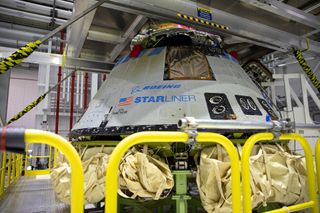
Boeing will take another crack at an uncrewed rendezvous with the International Space Station (ISS).
In December 2019, the company launched its CST-100 Starliner capsule to the ISS on an uncrewed demonstration mission called Orbital Flight Test (OFT), which was intended to show that the spacecraft can safely carry NASA astronauts.
But things didn't go as planned: Starliner suffered a glitch with its onboard timing system, got stranded in the wrong orbit and was brought down for a safe landing after circling Earth by itself for two days.
Related: Boeing's 1st Starliner flight test in photos
Analyses of OFT data subsequently revealed several serious software issues. Still, it remained unclear whether Boeing would launch another OFT or proceed directly to the next phase of Starliner vetting, a crewed test flight to the ISS.
We now have our answer.
"We have chosen to refly our Orbital Flight Test to demonstrate the quality of the Starliner system," Boeing representatives announced in a statement today (April 6).
Get the Space.com Newsletter
Breaking space news, the latest updates on rocket launches, skywatching events and more!
"Flying another uncrewed flight will allow us to complete all flight test objectives and evaluate the performance of the second Starliner vehicle at no cost to the taxpayer," they added. "We will then proceed to the tremendous responsibility and privilege of flying astronauts to the International Space Station."
The statement does not indicate when the second OFT will lift off.
Boeing had planned for this outcome financially. The company announced in late January that it was setting aside $410 million in case it was decided to refly OFT.
Boeing has been developing Starliner under a series of NASA contracts. The most recent of these, a $4.2 billion deal signed in 2014, covers the end of development work and the launch of six operational crewed missions to the ISS.
SpaceX is working on its own astronaut taxi, a capsule called Crew Dragon. Elon Musk's company holds a $2.6 billion NASA deal, also signed in 2014, to get Crew Dragon up and running and fly six missions to the orbiting lab.
Crew Dragon aced its version of OFT, called Demo-1, in March 2019. SpaceX is now gearing up for the Demo-2 crewed test flight, which is scheduled to lift off in mid- to late May.
- Boeing defends Starliner ground tests after problematic debut flight
- New Boeing video shows Snoopy's ride on Starliner Orbital Flight Test
- 'I can't wait to try it out': Starliner's 1st riders welcome capsule back to Earth
Mike Wall is the author of "Out There" (Grand Central Publishing, 2018; illustrated by Karl Tate), a book about the search for alien life. Follow him on Twitter @michaeldwall. Follow us on Twitter @Spacedotcom or Facebook.
<a href="https://www.space.com/your-favorite-magazines-space-science-deal-discount.html" data-link-merchant="space.com"" target="_blank">OFFER: Save 45% on 'All About Space' 'How it Works' and 'All About History'!
For a limited time, you can take out a digital subscription to any of <a href="https://www.space.com/your-favorite-magazines-space-science-deal-discount.html" data-link-merchant="space.com"" data-link-merchant="space.com"" target="_blank">our best-selling science magazines for just $2.38 per month, or 45% off the standard price for the first three months.
Join our Space Forums to keep talking space on the latest missions, night sky and more! And if you have a news tip, correction or comment, let us know at: community@space.com.

Michael Wall is a Senior Space Writer with Space.com and joined the team in 2010. He primarily covers exoplanets, spaceflight and military space, but has been known to dabble in the space art beat. His book about the search for alien life, "Out There," was published on Nov. 13, 2018. Before becoming a science writer, Michael worked as a herpetologist and wildlife biologist. He has a Ph.D. in evolutionary biology from the University of Sydney, Australia, a bachelor's degree from the University of Arizona, and a graduate certificate in science writing from the University of California, Santa Cruz. To find out what his latest project is, you can follow Michael on Twitter.

